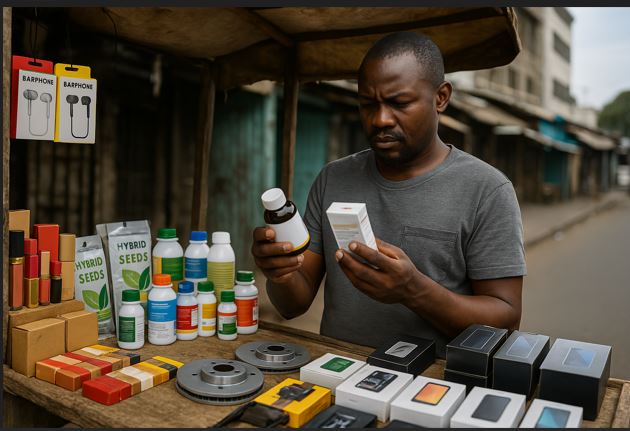
Once confined to backstreet markets and informal stalls, counterfeit trade in Kenya has evolved rapidly and alarmingly into a more complex, digital, and mainstream phenomenon.
The 2024 National Consumer-Level Survey, conducted by the Anti-Counterfeit Authority (ACA), reveals that today’s counterfeit ecosystem seamlessly integrates informal vendors with formal retail outlets and, more significantly, with online platforms.
Street vendors still dominate as sources of counterfeit goods, cited by 59.37% of consumers, followed closely by kiosks and small shops at 54.42%.
Notably, 21.31% of counterfeit purchases are now occurring in supermarkets, previously trusted formal outlets. Most significantly, 31.27% of counterfeit transactions are now taking place online.
From Facebook and Instagram storefronts to local e-commerce sites and WhatsApp groups, counterfeiters are increasingly operating with anonymity, scale, and impunity.
Consumers are unknowingly purchasing counterfeit pharmaceuticals, cosmetics, agricultural inputs (such as hybrid seeds and fertilisers), food products, agrochemicals, vehicle parts, and electronics—products with direct implications for public health and safety.
This new face of counterfeiting presents a challenge of unprecedented scale.
It is decentralised, difficult to trace, often indistinguishable from legitimate trade, and increasingly normalised by consumers, many of whom are simply seeking affordability.
For every genuine item on the shelf or online cart, there is a near-identical counterfeit lurking beside it—cheaper and dangerous.
The digital counterfeit economy presents new and unique challenges. While online platforms offer convenience, they often lack robust product verification protocols.
Consumers, drawn by discounts and ease of access, have limited means to authenticate products before purchasing.
This makes e-commerce a fertile ground for counterfeiters, who are quick to exploit regulatory gaps in this fast-moving space.
These problems are further compounded by other findings showing that 60.48% of consumers had bought counterfeit goods in the past year.
Most of the consumers discovered the truth only after using the product. Even more telling is that nearly 70% of these purchases were unintentional.
This deception not only undermines consumer confidence, it damages the credibility of legitimate businesses and threatens Kenya’s broader economic vision.
In light of this shifting landscape, there is an urgent need to reimagine our enforcement, awareness, legal, collaborative, and policy approaches.
Traditional enforcement methods—such as market raids and border checks—remain vital, but they are no longer sufficient. The counterfeit battleground has expanded, and our response must rise to meet it.
At the Anti-Counterfeit Authority, we have already begun adapting. We are enhancing our digital surveillance capacity and building strategic alliances with the Communications Authority, e-commerce platforms, and consumer protection agencies to actively monitor and act on online violations.
We are deploying authentication technologies that empower consumers to verify product legitimacy instantly—tools like the recently unveiled Bleep Technology, QR codes and SMS-based systems are being prioritised for public rollout.
We are also intensifying our public education campaigns. Awareness remains our strongest defense.
When consumers understand the risks—and know how to spot and report counterfeit products—the entire ecosystem shifts in favor of upholding authenticity.
Our outreach is expanding beyond town halls and roadshows to include aggressive online engagement, influencer partnerships, and vernacular communication tailored for diverse Kenyan communities.
But our ambition extends further. We are working closely with lawmakers to review and update Kenya’s and the East African Community's (EAC’s) legal framework, ensuring our intellectual property and consumer protection laws are aligned with the realities of today’s digital economy.
This is the work of a responsive and responsible public institution—one that refuses to be caught flat-footed in the face of evolving threats.
The ACA is not just enforcing laws; we are shaping policy, innovating enforcement, empowering the public, and defending the credibility of Kenya and EAC market systems.
Kenya’s long-term aspirations under Vision 2030—whether in industrialization, job creation, innovation, or trade competitiveness—depend on fair, safe, and trusted marketplaces.
The informal economy must no longer be a blind spot. And the digital economy must never be allowed to become a loophole for criminality.
The new face of counterfeiting is dynamic, digital, and dangerously deceptive. But it is not undefeatable. With strategic investment, collaborative action, and unwavering political will, we can combat this threat.
The Anti-Counterfeit Authority is leading the authenticity war
with credibility and alertness that the integrity of Kenya’s markets must—and
will—be protected.
Dr. Robi Mbugua Njoroge is the Executive Director of the Anti-Counterfeit Authority, a state agency mandated to combat counterfeit trade and promote intellectual property rights protection in Kenya.
















